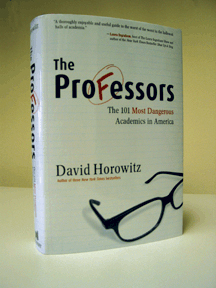
“My most difficult task in writing this book was living daily with the knowledge it provides of the enormous damage that several generations of tenured radicals have inflicted on our educational system,” writes conservative pundit David Horowitz in the introduction of his book The Professors: The 101 Most Dangerous Academics in America. “And of being cognizant of the unrelenting malice that so many of them hold in their hearts for a country that has given them the great privileges and freedoms they enjoy as a birthright.”
The author assigns a failing grade to three Penn faculty—Dr. Regina Austin, the William A. Schnader Professor of Law; Dr. Mary Frances Berry, the Geraldine R. Segal Professor of History; and Dr. Michael Eric Dyson, the Avalon Foundation Professor in the Humanities. According to Horowitz, they belong to an expanding legion of left-wing radicals who are “indoctrinating” American college students into everything from Marxism to supporting al-Qaeda.
“I don’t really have time to engage his concept or notion of dangerous,” said Austin, when contacted about her inclusion in the book. “I’m just going to keep on doing what I do.”
Horowitz describes Austin as an “advocate of racial separatism” and a proponent of Marxism. Among his more specific indictments is that she does not outright condemn African-American clerks who offer their friends discounts on merchandise and distribute stolen goods in their low-income neighborhoods. Austin pointed out that the study of informal markets and underground economics is a well-respected area of inquiry in economics, sociology, and law.
In answer to Horowitz’s plea for politically neutral college campuses, Austin said, “I don’t think it’s possible for an institution of very smart, very engaged people to be politically neutral. We’re the antithesis of zombies—colliding with each other and trying to figure out how to make a better world. Political neutrality is, if anything, stultifying.” Austin said she welcomes her students’ dissenting opinions, then added that Horowitz “missed the point of a contemporary university, which takes seriously the way in which human beings structure their interactions.”
Berry teaches American legal history and social policy, and also advises students in African-American history, but is currently on leave. Horowitz claims that her books are non-scholarly and ideological, based on their titles, and he portrays her career in government as anti-American and overly sympathetic to communist regimes. Citing an article by Linda Chavez, a Fox news channel political analyst, Horowitz writes, “Professor Berry was accustomed to carrying Mao Zedong’s Little Red Book of communist dicta in her purse.” In an email interview with The Daily Pennsylvanian, Berry denied this claim and asserted that she has sufficient scholarly publications to be a professor.
Horowitz criticizes Dyson for, among other things, his book Holler if You Hear Me: Searching for Tupac Shakur, an “attempt to lionize a gangster and musician” who acquired a long rap sheet before his own shooting death in 1996.
Dyson couldn’t be reached for comment, but in Holler if You Hear Me, he makes it clear that he’s not condoning the rapper’s illegal acts: “In fleeing from art to the actual, from appearance to reality, from studio to the streets, Tupac lost his life” [“Make It Plain!” March/April 2003].
Penn apparently isn’t as “dangerous” as Columbia, which achieved nine entries in Horowitz’s book, but it keeps company with Berkeley and the City University of New York. When asked if she might consider being listed in The Professors a badge of honor in recognition of noteworthy teaching, Austin replied, “I would be more honored if [recognition] came from my peers.”
—Chelsea Tanimura C’06




